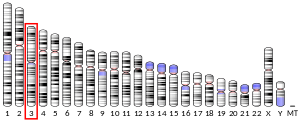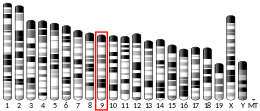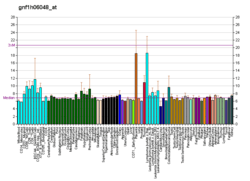PTPN23
Tyrosine-protein phosphatase non-receptor type 23 is an enzyme that in humans is encoded by the PTPN23 gene.[5][6]
References
- 1 2 3 GRCh38: Ensembl release 89: ENSG00000076201 - Ensembl, May 2017
- 1 2 3 GRCm38: Ensembl release 89: ENSMUSG00000036057 - Ensembl, May 2017
- ↑ "Human PubMed Reference:".
- ↑ "Mouse PubMed Reference:".
- ↑ Toyooka S, Ouchida M, Jitsumori Y, Tsukuda K, Sakai A, Nakamura A, Shimizu N, Shimizu K (Dec 2000). "HD-PTP: A novel protein tyrosine phosphatase gene on human chromosome 3p21.3". Biochem Biophys Res Commun. 278 (3): 671–8. doi:10.1006/bbrc.2000.3870. PMID 11095967.
- ↑ "Entrez Gene: PTPN23 protein tyrosine phosphatase, non-receptor type 23".
Further reading
- Nakajima D, Okazaki N, Yamakawa H, et al. (2003). "Construction of expression-ready cDNA clones for KIAA genes: manual curation of 330 KIAA cDNA clones". DNA Res. 9 (3): 99–106. doi:10.1093/dnares/9.3.99. PMID 12168954.
- Nagase T, Kikuno R, Ishikawa K, et al. (2000). "Prediction of the coding sequences of unidentified human genes. XVII. The complete sequences of 100 new cDNA clones from brain which code for large proteins in vitro". DNA Res. 7 (2): 143–50. doi:10.1093/dnares/7.2.143. PMID 10819331.
- Strausberg RL, Feingold EA, Grouse LH, et al. (2003). "Generation and initial analysis of more than 15,000 full-length human and mouse cDNA sequences". Proc. Natl. Acad. Sci. U.S.A. 99 (26): 16899–903. doi:10.1073/pnas.242603899. PMC 139241. PMID 12477932.
- Ota T, Suzuki Y, Nishikawa T, et al. (2004). "Complete sequencing and characterization of 21,243 full-length human cDNAs". Nat. Genet. 36 (1): 40–5. doi:10.1038/ng1285. PMID 14702039.
- Gerhard DS, Wagner L, Feingold EA, et al. (2004). "The Status, Quality, and Expansion of the NIH Full-Length cDNA Project: The Mammalian Gene Collection (MGC)". Genome Res. 14 (10B): 2121–7. doi:10.1101/gr.2596504. PMC 528928. PMID 15489334.
- Kimura K, Wakamatsu A, Suzuki Y, et al. (2006). "Diversification of transcriptional modulation: Large-scale identification and characterization of putative alternative promoters of human genes". Genome Res. 16 (1): 55–65. doi:10.1101/gr.4039406. PMC 1356129. PMID 16344560.
- Mariotti M, Castiglioni S, Maier JA (2006). "Expression analysis and modulation by HIV-Tat of the tyrosine phosphatase HD-PTP". J. Cell. Biochem. 98 (2): 301–8. doi:10.1002/jcb.20770. PMID 16408268.
- Mariotti M, Castiglioni S, Beguinot L, Maier JA (2006). "The tyrosine phosphatase HD-PTP is regulated by FGF-2 through proteasome degradation". Front. Biosci. 11: 2138–43. doi:10.2741/1956. PMID 16720300.
- Castiglioni S, Maier JA, Mariotti M (2007). "The tyrosine phosphatase HD-PTP: A novel player in endothelial migration". Biochem. Biophys. Res. Commun. 364 (3): 534–9. doi:10.1016/j.bbrc.2007.10.022. PMID 17959146.
This article is issued from
Wikipedia.
The text is licensed under Creative Commons - Attribution - Sharealike.
Additional terms may apply for the media files.




